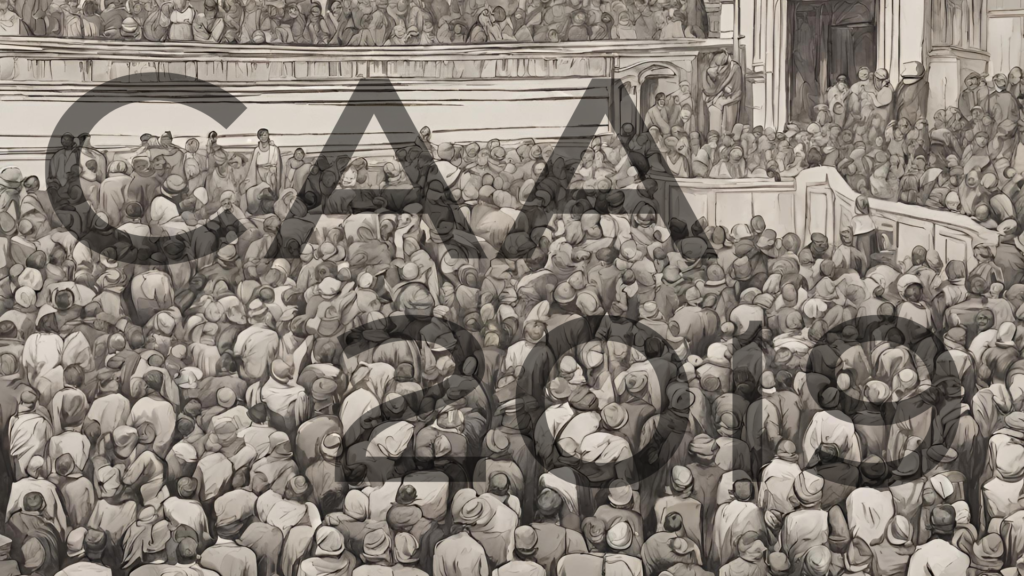Minority Rights and Article 14 Challenges: A Critical Analysis of the Citizenship Amendment Act 2019
By Vanshika Singh

Background
The Citizenship Amendment Act (CAA) of 2019 is an extremely controversial and crucial part of legislation in India that has ignited intense debate and observation. The scope of the research paper could include various aspects of this topic.
The Citizenship Amendment Act (CAA) of 2019 is legislation enacted by the Government of India that aims at modifying the eligibility criteria for Indian citizenship acquirement. This act mainly focused on providing a path to citizenship for religious minorities who faced discrimination in neighboring countries such as Bangladesh, Pakistan, and Afghanistan which included Sikhs, Hindus, Jains, Buddhists, Christians, and Parsis. The Act has garnered a significant amount of attention for various reasons both nationally and internationally.
One essential component of research on the CAA is its historical context. Understanding the historical background of the religious displacement of these minority communities in neighboring countries is crucial. Researchers can look into the particular incidents and patterns of oppression that led to the CAA’s creation. It also analyzes how these events shaped public discourse and policy decisions.
This paper also studies the legal implications of the CAA. Scholars can investigate the compatibility of this act with the Indian Constitution, in particular about the principle of secularism. The possible impacts of the CAA on the social fabric of the country, as well as its implications for religious freedom and the rights of minorities, could be analyzed in detail.
Another crucial aspect of the research paper is to scrutinize the social and political consequences of the CAA. Research also focuses on the protests and movements that flared across India in response to this act. It is significant to study the diverse perspectives which includes those in favor of the CAA, to provide a throughout understanding of the social and political issues surrounding this problem.
The CAA has also raised concerns about its connection to the National Register of Citizens (NRC). A research paper could examine how the CAA and NRC are correlated and the potential implications of their combined implementation on different communities and regions within India.
Moreover, the international aspects of the CAA are remarkable. Researchers investigate how the act had impacted India’s relations with neighboring countries and its global image. The response of the international community to the CAA, which comprises statements from various governments and international organizations, can be examined to understand the act’s global implications
Article 14 Of Indian Discrimination And Consti Tutional Validity Of Citizenship Amendment Act
Article 14 guarantees everyone in India equal protection under the law and equality before the law, irrespective of differences such as caste or religion. Preventing discrimination, providing equal access to justice, and consistently defending everyone’s rights are the goals of this constitutional pillar. The Citizenship Amendment Act (CAA), which was passed in 2019, offers certain religious minorities who are persecuted in Bangladesh, Pakistan, Afghanistan, and other nearby countries a quicker route to Indian citizenship. grants accelerated citizenship to Sikhs, Buddhists, Jains, Christians, Parsis, and Hindus; Muslims are not included in this offer.
Legal Challenges
Opponents claim that the CAA contravenes the fundamental idea of equal treatment under the law by favoring some religious organizations while ignoring Muslims, in violation of Article 14.
- Equality Principle Violation: The CAA is criticized for what is seen as its prejudice against Muslims, as it does not provide equal protection and justice in questions of citizenship by giving preference to some groups of people based only on their religion.
- Exclusivity Based on Religion: The CAA’s eligibility requirements, which only take into account a person’s religious identification, raise concerns because they go against the protection of minority interests and constitutional safeguards against religious discrimination.
- Arbitrary categorization: The CAA’s categorization raises concerns regarding its compliance with Article 14’s requirement for a reasonable classification in law because it lacks a rational basis and relies only on religious identification without a valid state goal.
- Exclusion of Specific Groups: Using Article 14 as justification, critics draw attention to the CAA’s exclusion of religious minorities who are subject to persecution from nations other than Afghanistan, Bangladesh, and Pakistan.
- Unequal Treatment of Religious Minorities: There are questions regarding whether the CAA complies with Article 14 because of its selective provisions for some religious groups while ignoring others who are persecuted in nearby nations.
- Effect on Stateless People: There are worries about the possible connection between the CAA and the National Register of Citizens (NRC), which could result in people losing their citizenship if they are unable to provide proof of it. This gives rise to concerns about the possibility of violating Article 14’s equality principle by having disproportionate consequences on marginalized people, especially Muslims.
Arguments of CAA
- Humanitarian Considerations: The CAA is presented as a humanitarian initiative that aims to provide discrimination-free refuge to religious minorities who are subject to persecution from a number of nearby nations. It seeks to give sanctuary to those who are most in need.
- Historical Context: Proponents of the CAA claim that it is important to consider the past prejudice against religious minorities in some of their neighboring countries. The aim is to rectify historical wrongs and provide marginalized communities with an equitable chance to acquire Indian
- Parliamentary Sovereignty – Some supporters contend that the Indian Parliament has the legitimate power to make laws because it is the body that enacts the constitution. Therefore, the CAA ought to be seen as a valid manifestation of the people’s will if it is approved by an elected legislature.
- Non-Interference with Existing Rights: Proponents stress that the CAA does not violate any group’s citizenship or existing rights in India. Instead, it gives some religious minorities another route too.
- All of these arguments work together to promote the CAA by emphasizing its humanitarian goals, historical reparations, the Parliament’s authority, and the protection of current rights while giving persecuted religious minorities an alternate route to citizenship
Impact Of Citizenship Amendment Act On Muslim Communities
Fears of Exclusion and Discrimination: Indian Muslims are afraid that the Citizenship and Accommodation Act (CAA) may lead to their exclusion and discrimination from the nation’s citizenship framework. They see the law as denying Muslims the opportunity to apply for expedited citizenshipp and reserving it only for non- Muslim minorities living in particular nearby countries.
Protests and Political Mobilisation: The enactment of the CAA sparked large-scale demonstrations, particularly among Muslims. These protests raised awareness of worries about possible legal discrimination. Additionally, they raised awareness of citizenship rights, religious liberty, and secularism on a national and worldwide level.
Fear of Linked Initiatives: Muslims are concerned about the CAA’s relationship to the projected National Register of Citizens (NRC). The community has become insecure due to worries about proving citizenship and the possibility of being declared stateless if they are unable to do so.
Influence on Socio-Political Identity: The CAA has affected Indian Muslims’ sense of social and political alienation and contributed to their sense of marginalisation. Some members of the community have taken a more assertive position as a result of this influence, standing up for their rights and seeking equal treatment under the law.
Diverse Reactions: The Citizenship Amendment Act (CAA) has elicited a range of responses from the Muslim community in India. Some express worry and disapproval, but others have more complex opinions. Some members contend that the law has no bearing on the citizenship status of Indian Muslims; yet, concerns remain regarding the law’s potential long-term effects. The community’s varied reactions to the CAA shape its complex response, ranging from contrasting viewpoints on the immediate effects to worries about possible long-term ramifications.
Impact on neighboring countries
The Citizenship Amendment Act (CAA) has far-reaching effects that go beyond India to neighbouring nations, impacting diplomatic disputes, minority circumstances, and international opinions.
Cultural Discord: Fearing meddling in their domestic affairs, the CAA damaged relations with Pakistan and Bangladesh.
Persecuted Minorities: It drew attention to the predicament of minorities in nearby nations and their potential for migration to India.
Impact on Bilateral Relations: Specifically harmed diplomatic relations and caused frustration between India and Bangladesh.
Internal Dynamics: Stimulated debates about how minorities are treated in surrounding countries, raising awareness and generating scrutiny in their communities.
Worldwide Perception
sparked worries about religiously motivated citizenship discrimination around the world, which had an effect on India’s reputation abroad and its trade. Diverse international reactions highlighted discussions about human rights and the non-interference principle
In conclusion, the CAA has far-reaching and complicated impacts that extend beyond India. It has an impact on the internal dynamics of a nations, regional diplomacy, and the worldwide view of India’s commitment to secularism and pluralism.
Conclusion
The Citizenship Amendment Act 2019 (CAA) has been a controversial topic in India since its introduction in December 2019. The Act seeks to amend the Citizenship Act, of 1955, to provide Indian citizenship to non- Muslim refugees from Pakistan, Bangladesh, and Afghanistan who have been living in India for at least five years. The Act has been strongly opposed by many sections of the Indian population, including student activists, human rights groups, political parties, and civil society organizations, on the grounds that it discriminates against Muslims and violates the Indian Constitution. The conclusion of this research into the Citizenship Amendment Act 2019 is that it is a highly controversial law that has been met with fierce opposition from various groups in India. The CAA is seen as divisive and discriminatory against Muslims, and a violation of the Indian Constitution. However, the Act has also been defended by some groups in India, who argue that it is necessary to provide refuge to persecuted non-Muslim minorities in neighboring countries. The debate over the CAA is likely to continue in India, and it remains to be seen whether the Act will remain in place or be amended in the future.

About Author
Vanshika Singh is a law student at Alliance School of Law, Alliance University, Banglore.